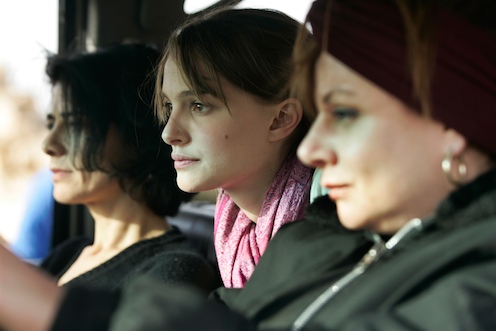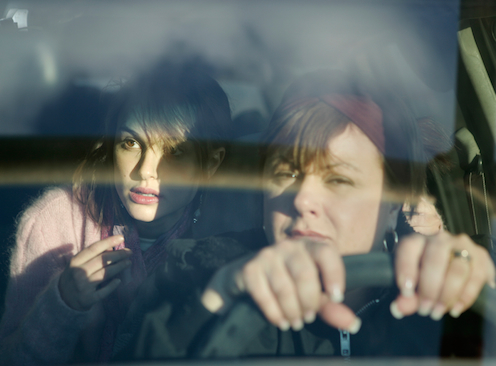Free Zone
Full Description
Amos Gitai opens his newest feature with a daring directorial choice: one impossibly long close-up watching the gorgeous American actress Natalie Portman stare out of a car window in rainy Jerusalem, sobbing uncontrollably.
Thus begins the journey of Rebecca, who, after ditching her fiancé and his family in Israel, finds solace with the tough, pragmatic Hanna (Hanna Laslo, Alila, SFJFF 2004), a Russian-Israeli limo driver. To escape her sorrow, Rebecca is willing to ride along anywhere with Hanna, who is headed for the "free zone"--a place in Jordan where goods and money are exchanged tax-free regardless of nationality or religion--to claim money owed in her husband’s questionable dealings. Hanna is not sure she wants a passenger-- particularly a distressed young American woman--since she has never ventured this far into Jordan before (and neither has director Gitai, the first high-profile Israeli to get official permission to shoot there). 'But their road trip begins, as they cross borders and terrains, both political and psychological. Once on the other side, where they are supposed to pick up the money from a mysterious "American," they are intercepted by Leila (the stunning Hiam Abbas, who recently starred in Munich, Paradise Now and The Syrian Bride), a shrewd but thoughtful Palestinian businesswoman.
The three women form an inextricable bond despite vast cultural and political differences. Gitai has created a brilliant, nuanced drama with strong female protagonists each seeking meaning in their complex social realities. It is a journey fraught with risk, faith and the desire for personal and political self determination.
Filmmaker Bio(s)
For over 20 years, Amos Gitai has brought to the screen images of the Jewish Diaspora and Israeli life alike. Employing both documentary and fictional styles, Gitais uses the camera to reveal history in all its contradictions and ambivalence.
He challenges us, the audience, to scrutinize history anew. Using landscape as a pictorical reference, Gitai traverses time and space to posit not merely a personal experience but a universal one that speaks of migration, struggle and alienation.
In 1973, during the Yom Kippur War, a Red Cross helicopter Gitai was in was shot down by Syrian forces. Following this, Gitai began using his camera as a means of recording and questioning the historical and political events around him. Both his documentaries and his dramatic films present a brutally honest reality, one bejeweled with political conflict, personal plight and a search for meaning. It is a reality that we recognize both as individuals and as members of the larger society.
Amos Gitai was born in Haifa in 1950. Between 1971 and 1975, Amos Gitai studied architecture in the Israel Institute of Technology, and also created his first 8- and 16-mm films. He continued his architecture studies at the University of California in Berkeley where he specialized in the theory of vernacular architecture, and received his Ph.D. in 1986.
In 1977 he began working for Israeli television, where he made several documentaries. After two of his films, Political Myths and House, were censored by the TV authorities, and when Field Diary, shot shortly before and during the Lebanon War, met with much hostility, Gitai moved in 1982, to Paris. From Paris, Gitai continued studying themes of exile, emigration and geography, creating films exceeding the bounds of traditional genre defitions of narrative.
Director(s)
Country(ies)
Language(s)
Release Year
Festival Year(s)
Running Time
90
Cast



